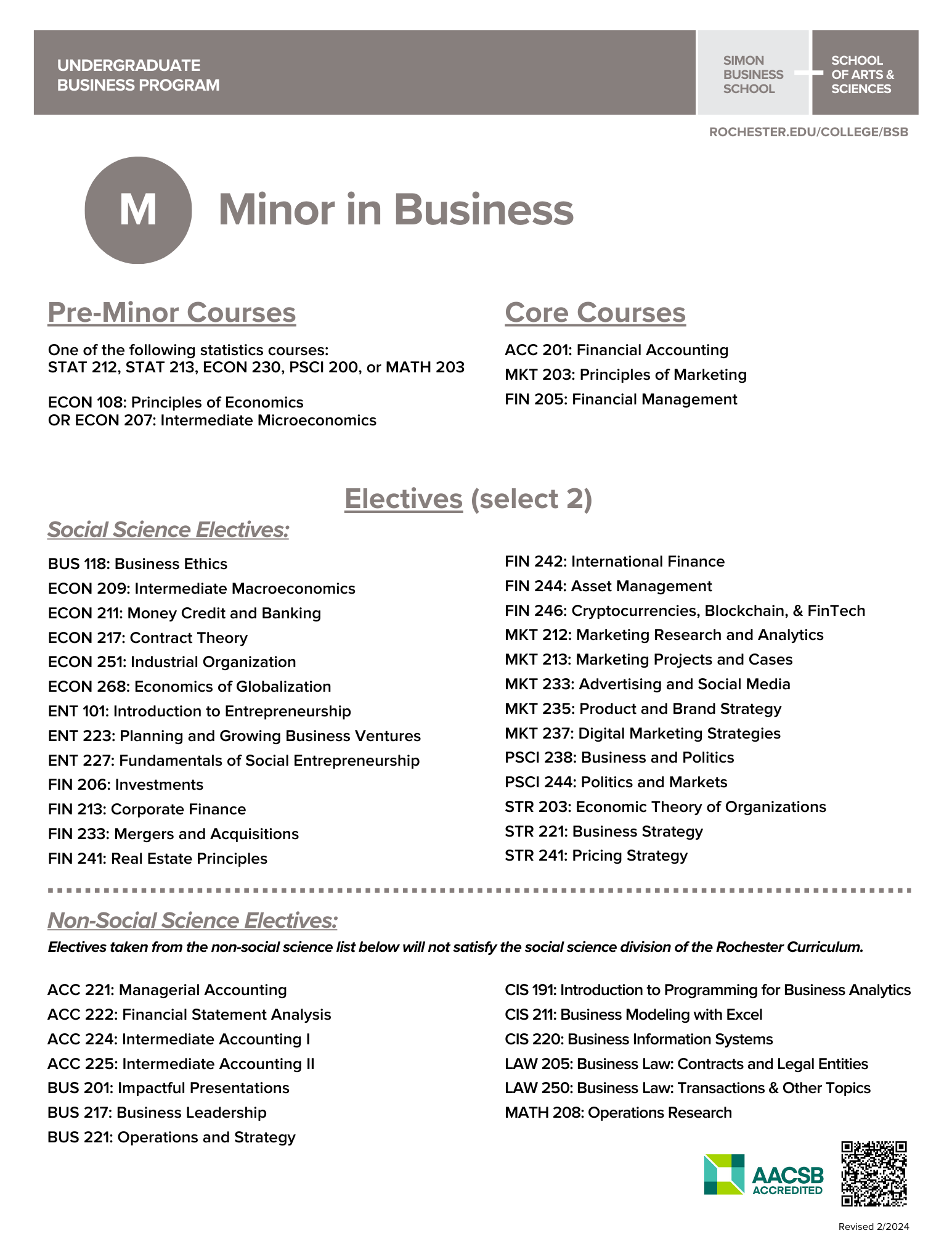Business Minor
The business minor aims to build core business skills. To declare a minor, you must first complete both pre-minor requirements listed below. The minor consists of five courses, including three required core courses and two electives.
Students using the business minor to fulfill the social sciences divisional requirement of the Rochester Curriculum MUST choose both of their minor electives from the list of social sciences courses.
Students whose business minor counts as Social Science will show as "BUX" in UR Student. Students whose business minor does NOT count as Social Science will show as "BU" in UR Student. If you need to switch between BUX and BU, you will need to drop the existing minor by completing a Rochester Curriculum Change Form and then declare the new BUX or BU minor.
If you have questions about the minor requirements, please connect with an advisor.
Students are eligible to officially declare for the business minor by submitting a minor declaration form once all pre-minor courses have been completed.
ECON 108: Principles of Economics (F/S) or ECON 207: Intermediate Microeconomics (F/S)
Plus one of the following:
- STAT 190: Introduction to Statistical Methodology (previously STAT 213)
- STAT 180: Introduction to Applied Statistical Methodology (previously STAT 212)
- ECON 230: Economic Statistics
- MATH 203: Introduction to Math Statistics*
- STAT 216: Applied Statistics II
- PSCI 200: Applied Data Analysis
- PSCI 205: Data Analysis II
*MATH 201 is a prerequisite for MATH 203.
ACC 201: Financial Accounting
MKT 203: Principles of Marketing
FIN 205: Financial Management
Electives (choose 2):
Social Sciences electives
- BUS 118/PHIL 118: Business Ethics and Corporate Social Responsibility (every other S)
- BUS 201: Impactful Presentations
- BUS 217: Business Leadership (S)
- BUS 221: Operations and Strategy (F/S)
- ECON 209: Intermediate Macroeconomics (F/S)
- ECON 211: Money Credit and Banking (F)
- ECON 217: Economics of Contracts, Organizations,
and Markets (F) - ECON 251: Industrial Organization (S)
- ECON 268: Economics of Globalization (F)
- ENT 101: Introduction to Entrepreneurship (F)
- ENT 223: Entrepreneurship to Plan and Grow a Business (S)
- ENT 227: Fundamentals of Social Entrepreneurship (every other S, odd years)
- FIN 206: Investments (S)
- FIN 213: Corporate Finance (F)
- FIN 233: Mergers and Acquisitions (S)
- FIN 241: Real Estate Principles (F)
- FIN 242: International Finance (F)
- FIN 244: Asset Management (S, odd years)
- FIN 246: Cryptocurrencies, Blockchain, and FinTech (S)
- MKT 212: Marketing Research and Analytics (F)
- MKT 213: Marketing Projects and Cases (F/S)
- MKT 233: Advertising and Social Media (S)
- MKT 235: Product and Brand Strategy (F)
- MKT 237: Digital Marketing Strategies (S)
- PSCI 238: Business and Politics (S)
- PSCI 244: Politics and Markets (S)
- STR 203/ECON 214: Economic Theory of Organizations (F/S)
- STR 221: Business Strategy (S)
- STR 241/ECON 241: Pricing Strategy (F)
Non-Social Sciences electives
(Electives taken from the non-social science list below will not satisfy the social sciences division of the Rochester Curriculum.)
- ACC 221: Managerial Accounting (S)
- ACC 222: Financial Statement Analysis (S)
- ACC 224: Intermediate Accounting I (F)
- ACC 225: Intermediate Accounting II (S)
- CIS 191: Introduction to Programming for Business Analytics (F/S)
- CIS 211: Business Modeling with Excel (F/S)
- CIS 220: Business Information Systems (F/S)
- LAW 205: Business Law: Contracts and Legal Entities (F)
- LAW 250: Business Law: Transactions and Other Topics (S)
- MATH 208: Operations Research (F)
F= offered fall semester
S= offered spring semester
F/S= offered both fall and semesters
College rules on overlap apply:
- No more than two courses may overlap between the five required courses comprising the business minor and any major or second minor.
- No more than one course may overlap between the business minor and a cluster.
- Prerequisite courses do not count as overlaps since they are not part of the minor itself.

